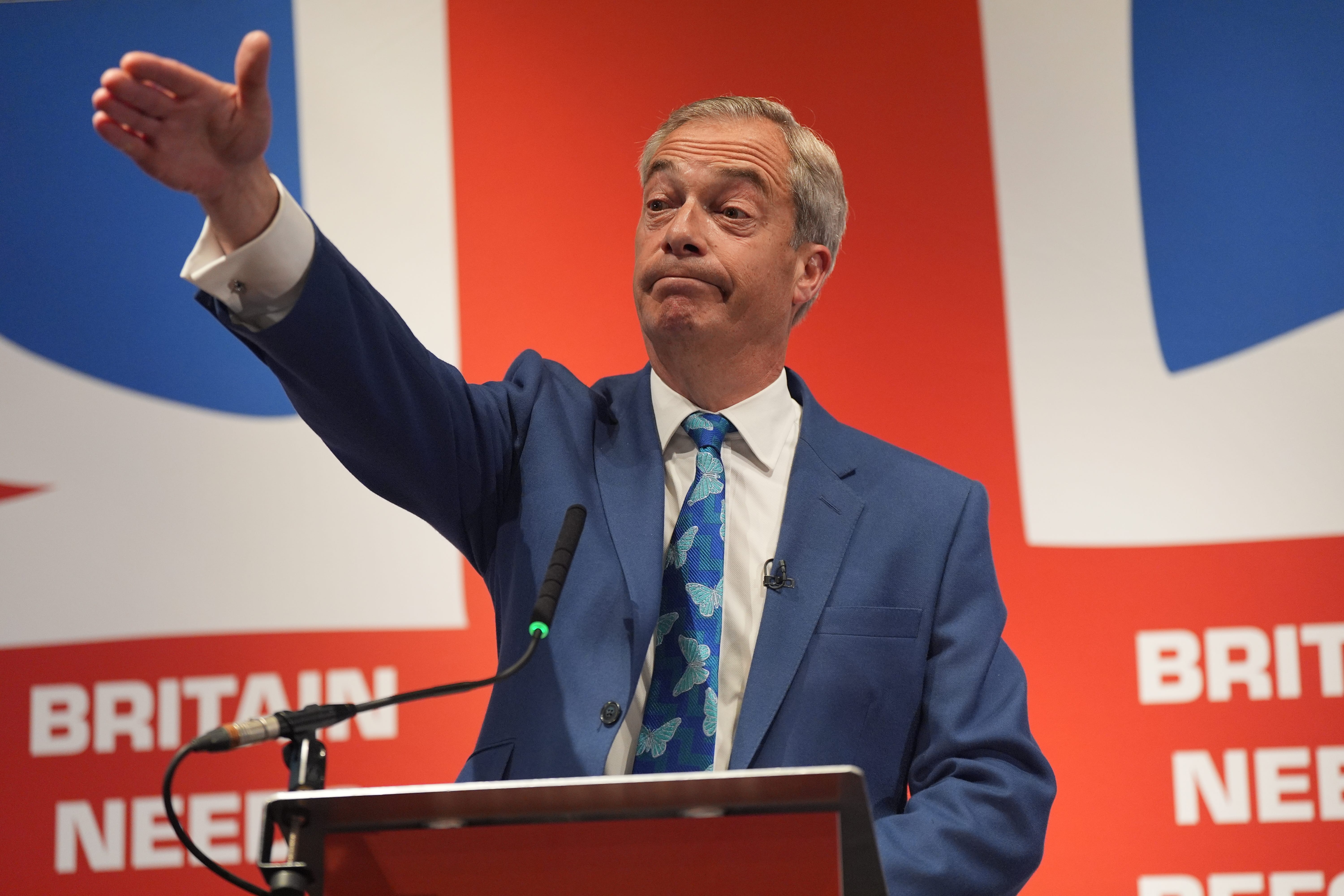Reform Party's Local Election Performance: A Key Test For Farage

Table of Contents
2. Pre-Election Expectations and Predictions for the Reform Party:
Polling Data and Public Sentiment:
Pre-election polls painted a mixed picture for the Reform Party. While some surveys suggested modest gains in certain areas, others predicted a less impressive showing, highlighting the uncertainty surrounding the Reform Party's local election performance. Discrepancies existed between national polls and localized surveys, making accurate predictions challenging. The general public sentiment, as gauged by social media and news commentary, indicated a degree of skepticism towards the party's ability to translate national appeal into local victories. This sentiment played a role in shaping pre-election expectations surrounding the Reform Party local elections.
Key Battlegrounds and Target Seats:
The Reform Party strategically focused its campaign efforts on specific local council areas. These included several traditionally Conservative-leaning constituencies where they aimed to capitalize on public dissatisfaction with the governing party. Other target seats were in areas with strong anti-EU sentiment, a key plank of the Reform Party's platform.
- Areas Targeted: Specific examples include [insert specific local council areas and rationale for targeting them]. Demographic analysis suggests a significant proportion of voters in these areas were receptive to the Reform Party's core messages.
- High-Profile Candidates: [mention names of high-profile candidates and their roles in the campaign]. Their presence was intended to attract greater media attention and boost local support.
- Demographic and Political Leanings: The targeted areas were characterized by [describe demographics and political leanings]. This understanding informed the party's campaign strategy and messaging.
2.2. Analysis of the Reform Party's Local Election Results:
Overall Performance and Seat Gains/Losses:
[Insert a concise summary of the Reform Party's overall performance, including the total number of seats won and lost. Use visuals like charts and graphs to illustrate the data clearly.] The Reform Party's overall performance in the local elections can be summarized as [positive, negative, or mixed] with [specific data points to illustrate]. This result represents [compare to previous local elections].
Performance in Key Battleground Areas:
[Analyze the Reform Party's performance in the previously identified target areas. Explain reasons for success or failure in each area, supported by specific data and comparative analysis with previous results.] In [Specific area A], the Reform Party [succeeded/failed] due to [reasons for success/failure]. Similarly, in [Specific area B], the results were [positive/negative] because of [reasons]. This varied performance across key battlegrounds indicates [conclusion about regional differences in performance].
- Specific Data for Each Key Area: [Provide detailed data for each key area, comparing performance to previous elections and highlighting significant changes.]
- Comparison to Previous Elections: [Compare the current results to previous local election results for the same areas, identifying trends and changes.]
- Unexpected Outcomes: [Highlight any unexpected wins or losses, discussing potential reasons for these deviations.]
2.3. Factors Influencing the Reform Party's Local Election Outcome:
Impact of National Political Climate:
The national political climate significantly influenced the local election results. [Discuss specific national events, policies, or trends that impacted the Reform Party’s performance. For example, did national controversies overshadow the local campaigns? Did shifts in national public opinion affect local voting patterns?]. The national political context played a [positive/negative/neutral] role in the Reform Party’s overall success.
Effectiveness of the Reform Party's Campaign Strategy:
The Reform Party’s campaign strategy showcased both strengths and weaknesses. [Evaluate the strengths and weaknesses of their campaign, including messaging, candidate selection, and resource allocation. Provide concrete examples to support your evaluation]. Areas needing improvement include [list areas for improvement], while successful aspects involved [list successful aspects]. The overall effectiveness of the Reform Party's strategy can be characterized as [effective/ineffective/mixed].
Role of Media Coverage and Public Perception:
Media coverage played a critical role in shaping public perception of the Reform Party. [Analyze the media's portrayal of the party and its candidates, examining both positive and negative coverage. Assess the impact of this coverage on voter turnout and voting patterns]. The role of social media and online campaigning also influenced public opinion and, to an extent, the overall outcome of the Reform Party local elections.
- Specific Campaign Strategies: [Discuss specific strategies like targeted advertising, rallies, door-to-door campaigning, and their effectiveness.]
- Media Portrayals: [Analyze media portrayals – were they generally positive, negative, or neutral? How did this affect public opinion?]
- Impact of Social Media: [Discuss the role of social media in shaping public opinion and voter engagement.]
2.4. Implications for Nigel Farage and the Future of the Reform Party:
Assessment of Farage's Leadership:
The Reform Party's local election performance will undoubtedly impact Nigel Farage's leadership. [Evaluate the impact of the election results on Farage's standing within the party and his overall leadership. Consider potential challenges to his authority and future prospects.] The results will likely [strengthen/weaken] Farage's position within the party, depending on [specific factors affecting his position].
Potential Changes and Future Strategies:
The election results will likely necessitate changes in party strategy and possibly leadership. [Discuss potential changes in party strategy or leadership in light of the election results. Consider potential internal conflicts, shifts in party platform or messaging, and future election prospects.] The party may need to [re-evaluate its message/target different demographics/restructure its organization] to enhance its future prospects.
- Potential Internal Conflicts: [Discuss potential internal power struggles or disagreements within the party.]
- Shifts in Party Platform: [Analyze potential changes to the party's core message or policies.]
- Future Election Prospects: [Project the party's prospects in upcoming local, regional, and national elections.]
3. Conclusion: The Reform Party's Local Election Performance: What Next for Farage?
The Reform Party's performance in the recent local elections has proven to be a significant test for Nigel Farage's leadership. The results, while [positive/negative/mixed], offer valuable insights into the party's strengths and weaknesses. Factors such as the national political climate, campaign strategy, and media coverage all played a crucial role in shaping the outcome. The implications for the party's future and Farage's leadership are substantial, necessitating a thorough review of their approach. What are your thoughts on the Reform Party's local election showing? Share your analysis of the Reform Party's future in the comments below. For further reading, visit [link to relevant news sources or analysis].

Featured Posts
-
 Financing A 270 M Wh Bess In Belgiums Complex Merchant Market
May 03, 2025
Financing A 270 M Wh Bess In Belgiums Complex Merchant Market
May 03, 2025 -
 157 Gola Lakazet Izprevarva Papen I Priblizhava Lion Do Vrkha
May 03, 2025
157 Gola Lakazet Izprevarva Papen I Priblizhava Lion Do Vrkha
May 03, 2025 -
 Avrupa Ile Is Birliginin Gelecegi Kritik Konular Ve Beklentiler
May 03, 2025
Avrupa Ile Is Birliginin Gelecegi Kritik Konular Ve Beklentiler
May 03, 2025 -
 Mlw Battle Riot Vii Bobby Fishs Participation Announced
May 03, 2025
Mlw Battle Riot Vii Bobby Fishs Participation Announced
May 03, 2025 -
 Epanidrysi Toy Kratoys Katapolemisi Tis Diafthoras Stis Poleodomies
May 03, 2025
Epanidrysi Toy Kratoys Katapolemisi Tis Diafthoras Stis Poleodomies
May 03, 2025
